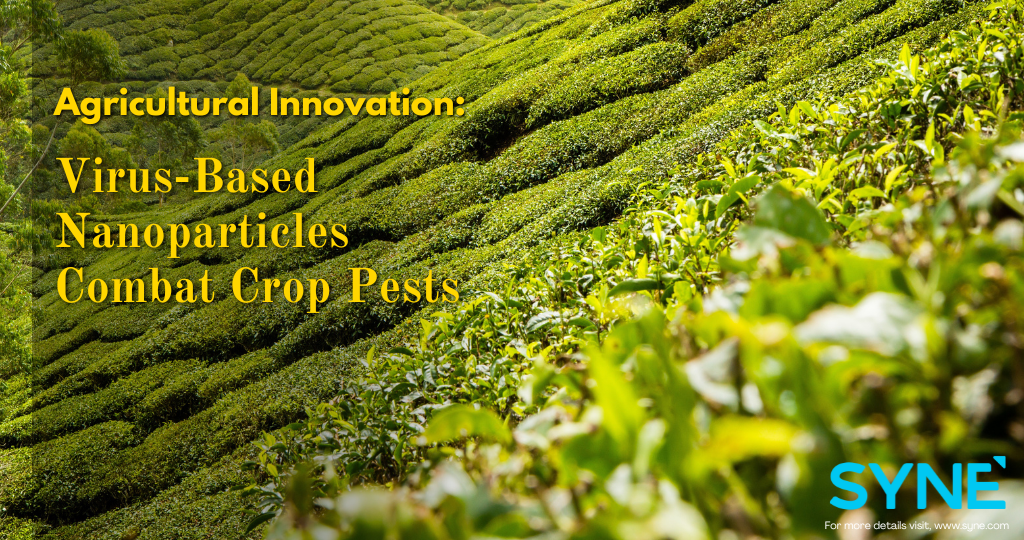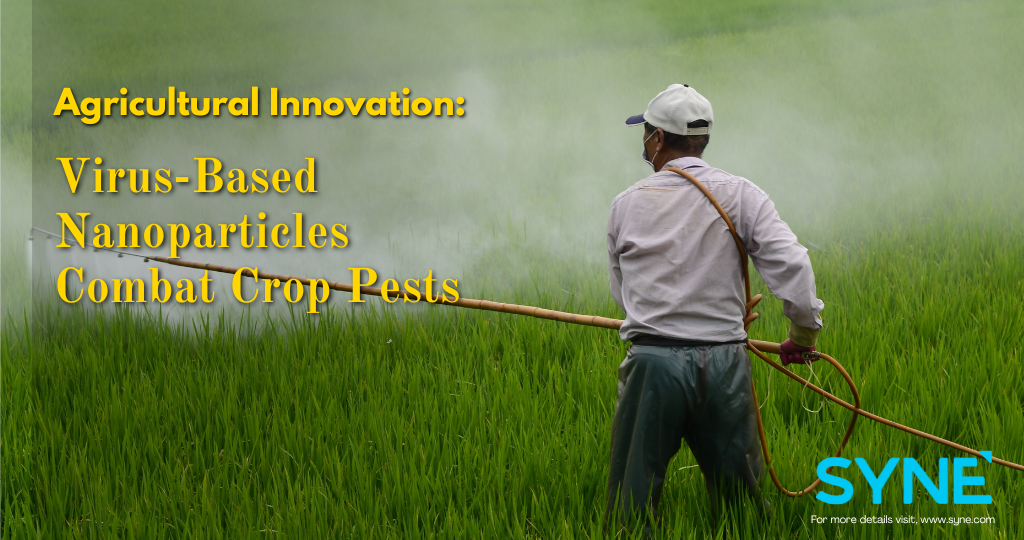Agricultural Innovation: Virus-Based Nanoparticles Combat Crop Pests
Agriculture
CREATED
10 Oct 2023
syne.com/story/agricultural-innovati...
The Future of Pest Control: A Promising Ally for Farmers in Pest Control
Agriculture plays a pivotal role in feeding the world's growing population. However, the constant battle against pests, which can devastate crops and reduce yields, poses a significant challenge for farmers. Traditional pest control methods, such as chemical pesticides, have raised concerns about their environmental impact and potential harm to human health. In this context, emerging technologies offer new solutions. One such innovative approach is the use of nanoparticles made from plant viruses, which could revolutionize pest control in agriculture and become a new ally for farmers.
The Science behind Virus-Based Nanoparticles
Plant viruses are tiny infectious agents that can naturally infect plants. They possess unique properties that make them promising candidates for the development of nanoparticles for pest control. These nanoparticles are engineered from plant viruses or their derivatives, and they exhibit remarkable characteristics that can be harnessed for pest management.
Recently nanoparticles are developed and fashioned from plant viruses that can deliver pesticide molecules to soil depths that were previously unreachable. This advance could potentially help farmers effectively combat parasitic nematodes that plague the root zones of crops, all while minimizing costs, pesticide use and environmental toxicity.
Controlling infestations caused by root-damaging nematodes has long been a challenge in agriculture. One reason is that the types of pesticides used against nematodes tend to cling to the top layers of soil, making it tough to reach the root level where nematodes wreak havoc. As a result, farmers often resort to applying excessive amounts of pesticide, as well as water to wash pesticides down to the root zone. This can lead to contamination of soil and groundwater.
To find a more sustainable and effective solution, plant virus nanoparticles was developed that can transport pesticide molecules deep into the soil, precisely where they are needed.
The star of this approach is the tobacco mild green mosaic virus, a plant virus that has the ability to move through soil with ease. Researchers modified these virus nanoparticles, rendering them non-infectious to crops by removing their RNA. They then mixed these nanoparticles with pesticide solutions in water and heated them, creating spherical virus-like nanoparticles packed with pesticides through a simple one-pot synthesis.
This one-pot synthesis offers several advantages. First, it is cost-effective, with just a few steps and a straightforward purification process. The result is a more scalable method, paving the way toward a more affordable product for farmers. Second, by simply packaging the pesticide inside the nanoparticles, rather than chemically binding it to the surface, this method preserves the original chemical structure of the pesticide.
Moreover, the tobacco mild green mosaic virus is already approved by the Environmental Protection Agency (EPA) for use as an herbicide to control an invasive plant called the tropical soda apple. This existing approval could further streamline the path from lab to market.
While the researchers have not yet tested the nanoparticles on nematodes lurking beneath the soil, they note that this study marks a significant step forward.
Future research will involve testing the nanoparticles on actual infested plants to assess their effectiveness in real-world agricultural scenarios.
Targeted Delivery Mechanism
One of the most significant advantages of virus-based nanoparticles is their ability to deliver pest control agents with pinpoint accuracy. These nanoparticles can be designed to encapsulate various pest control agents, such as pesticides or beneficial microorganisms. By doing so, they ensure that these agents are delivered precisely where needed—directly to the plants suffering from pest infestations. This targeted approach minimizes collateral damage to non-target organisms and reduces the overall amount of pest control agents required.
Eco-Friendly and Biodegradable
Unlike chemical pesticides, which can persist in the environment and harm non-target species, virus-based nanoparticles are biodegradable and environmentally friendly. Their natural origin and biodegradability make them a sustainable alternative for farmers looking to minimize their ecological footprint. Furthermore, these nanoparticles pose fewer risks to the health of farmers and consumers, as they do not leave harmful chemical residues on crops.
Potential for Resistance Management
Pest resistance to chemical pesticides is a growing concern in agriculture. Virus-based nanoparticles offer a novel approach that can help mitigate resistance development. As the mode of action differs from traditional pesticides, pests may be less likely to evolve resistance to these nanoparticles. This could lead to more sustainable pest control practices in the long term.
Challenges and Considerations
While the potential benefits of virus-based nanoparticles in pest control are promising, several challenges and considerations must be addressed:
Safety and Environmental Impact: Thorough safety assessments are required to ensure that these nanoparticles do not inadvertently harm non-target organisms or have unintended ecological consequences. Rigorous testing and monitoring protocols should be in place.
Regulatory Approval: The introduction of any new technology in agriculture faces regulatory hurdles. Virus-based nanoparticle products would need to meet stringent safety and efficacy standards to gain approval for widespread use.
Public Perception: Public acceptance is crucial for the adoption of any new technology, especially one involving the use of viruses. Proper communication and education about the safety and benefits of these nanoparticles are essential.
Nanoparticles made from plant viruses have the potential to be a game-changer in pest control for farmers. Their ability to deliver pest control agents with precision, their eco-friendliness, and their potential to address issues of resistance make them a promising ally for modern agriculture. While challenges remain, continued research and development in this field hold the promise of reducing the environmental impact of pest control practices and ensuring food security for a growing global population. Farmers, scientists, and policymakers should collaborate to harness the full potential of virus-based nanoparticles as a sustainable and effective solution in the fight against agricultural pests.





View Comments